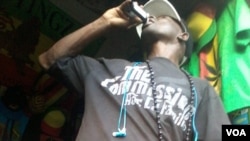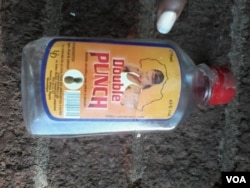Calamities associated with excessive intoxication - dementia, seizures, liver disease and early death - have not deterred young people in Zimbabwe from abusing alcohol and dangerous drugs.
The current upsurge in drug and alcohol abuse among the youth is worrying with reports of several drug-induced psychosis cases at the country's hospitals.
Cordain, Broncoleer, Cannabis, Maragada, Musombodhiya, Tegu-Tegu and Zed are some of the popular substances that youth in Zimbabwe are taking.
Most of the youth, who engage in these activities, claim that they have nothing to do in the country due to lack of jobs. But some parents believe that there is general moral decadence in the country leading to drug and alcohol abuse.
University graduate, Tatenda Maramwidze, who has failed to find a job since leaving college in 2013 after doing an economics degree, says youth are drowning their sorrows in drugs and alcohol.
“The drugs help us to forget our misery. It is not that easy to be looked after by your parents years after graduation. Because of this pressure we end up doing drugs so that we can get drunk and forget our problems.”
Maramwidze says it is easy to get stoned in Harare. “The drugs we take include Bronco, ZED and also mbanje (cannibas). The drugs are very cheap and even for a dollar you can get drunk very fast.”
Another youth, who preferred to be identified only as Bra Gidza from Highfield, concurs, noting that even spirits are cheap for unemployed youth.
“I am drinking this stuff because I have nothing to do. I am not employed. The drink popularly known as Musombodyiya comes with guys who work at Afdis, so they bring it to us and sell it at 50 cents per 750ml bottles. One bottle is enough for the three and four of us as it needs about 5litres to dilute it.”
DROWNING SORROWS
These youth are aware of the dangers of taking drugs and abusing alcohol. Elmon Takavada is one of them. Takavada says while he is aware of the health problems associated with drugs, he has no choice but to drown his sorrows in some of the substances.
“We prefer to drink the spirits because they are cheaper. You can get a small job to offload something from a car maybe you are helping someone to shift from one location to another and you get $3 and the next thing you end up buying the spirits. The stress of not having a job is the one pushing me to drink the spirits.”
Ambrose Makoni, a 30 year-old Manyame resident, says he is recording brisk business with the Tegu-Tegu spirit, which he is selling even without a liquor license.
“Tegu- Tegu is a locally brewed beer from Mutare. It is a very strong beer. Alcohol content is between 30-40%. Normally youths drink the beer because it has high alcohol content so they get drunk faster. If you take 3-4 lids you will be done that is if you are drinking it undiluted.”
Peter Muchengeti, a Harare resident, who is also a human rights activist, argues that the government is to blame for its failure to control the selling of some of these items on the local market.
“There is growing and worrisome phenomenon of drug and alcahol abuse by our children mainly due to lack of jobs - idleness and government failure to control the illegal entry of intoxicating drinks especially via the Mozambique border. Even at colleges our children take all sorts of intoxicating drinks and this is also partly due to moral decadence.”
Muchengeti says government should tighten its borders in order to control the smuggling of these alcoholic beverages. He also believes that children these days have too many rights that give them the ability to end up abusing various substances.
“Government should install controlling measures especially on the importation of drugs and intoxicating drinks especially from our neighbouring countries. Too many rights have also been afforded to the young people such that these kids no longer have respect and cannot match the rights with responsibilities.”
The drugs affect their self-control and they are no longer able to make sound decisions."
A clinical psychologist with one of the state hospitals, who refused to be identified, believes that drug and alcohol abuse is on the increase due to the current social and economic problems in Zimbabwe.
He says some of the youth end up in hospital after taking getting too stoned.
“The drugs affect their self-control and they are no longer able to make sound decisions. Drug abuse is a global problem and here in Zimbabwe it is becoming a big problem. Prevention is the only long term solution.”
Statistics released in August last year by government showed that alcohol and drug abuse is highest among young adults aged between 15 to 29 years and lowest among adults aged 65 years and older.







